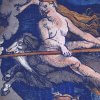In The Maier Files series, the character Albruna Gudrun leads the “Hexenkommando,” an elite force of “witch” girls. These characters significantly influence the plot, reflecting the historical and esoteric undertones prevalent in the series. Drawing on this theme, we delve into Cautio Criminalis, a key work that addressed the real historical witch trials that devastated Germany in the early modern period.
Historical Context
In the 16th and 17th centuries, Germany witnessed some of the most brutal witch hunts in Europe, where tens of thousands of people, mostly women, were tortured and executed. At the height of these persecutions, a Jesuit priest named Friedrich Spee von Langenfeld emerged as a powerful and unusual voice advocating for reform. His seminal work, Cautio Criminalis (1631), meaning A Book on Witch Trials, stands as a testimony to his moral courage.
Who Was Friedrich Spee?
Born in 1591, Spee was a Jesuit theologian and a moral philosopher. He lived through the worst of the witch trials in Germany, spending much of his career as a confessor to the condemned. His direct experiences led him to believe that many of the women executed were innocent. This conviction drove him to write Cautio Criminalis, a fierce critique of the witch trials and an indictment of the legal and theological frameworks that supported them.
Why Was Cautio Criminalis Remarkable?
Spee’s work was groundbreaking because it did not merely question the procedures of the witch trials—it demanded their cessation. Unlike earlier authors who either endorsed witch hunts or were indifferent to them, Spee condemned the use of torture and challenged the fairness of trials based on spectral evidence and confessions obtained through torture. He exposed the moral and judicial hypocrisy that allowed innocents to be murdered in the name of justice.
Spee’s arguments were bold. He used reason and legal principles to dismantle the prosecution’s case. For instance, he questioned how a confession extracted under torture could be trusted and how anyone could escape punishment in a system designed to condemn. He noted that the witch hunts fed off themselves, creating more witches through confessions and accusations. His call for caution in criminal cases gave the book its name—Cautio Criminalis.
Witch Trials in Germany
Germany, at the time, was a fragmented collection of states under the Holy Roman Empire, and the witch hunts varied in intensity across these regions. The Catholic prince-bishoprics along the Rhine and Main Rivers, such as Würzburg and Bamberg, saw some of the worst persecutions. In these territories, hundreds of people were tortured and burned, often based on accusations as trivial as a neighbor’s bad fortune.
Unlike other European countries, where the witch hunts were often ecclesiastically driven, the trials in Germany were typically overseen by secular courts. The secular judges and lawyers believed they were combating a vast conspiracy of witches in league with the devil.
The Significance of Cautio Criminalis Today
Though written in the 17th century, Cautio Criminalis remains a critical work in understanding the dangers of unchecked power and hysteria. It reminds us of the importance of justice, fairness, and compassion, even in the face of public panic. The witch trials were a dark chapter in human history, but they serve as a warning about how fear can lead to the persecution of innocent people.
Spee’s work is still relevant today as it speaks to modern issues of justice and human rights, particularly in situations where fear and prejudice drive legal actions. His call for caution and due process is a timeless reminder that the rule of law must protect the innocent above all else.
If you are intrigued by historical justice and moral courage, Cautio Criminalis is a must-read. Available on Amazon, this book offers a profound look into one of the darkest periods in European history and the lone voice that stood against the tide of brutality. It serves as a compelling lesson on the importance of upholding human dignity, especially in times of societal unrest.






